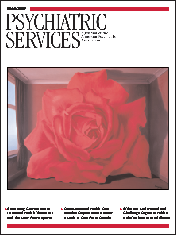To the Editor: The suffering caused by serious illnesses is, by nature, stressful for both patients and family members. However, families rarely receive education about stress reduction. Mindfulness-based stress reduction (MBSR) is a group-based intervention available in most metropolitan areas that is effective in reducing psychological symptoms (
1). MBSR training may be of benefit to family caregivers of patients with dementia and to caregivers of patients with other chronic illnesses. More broadly, expansion of psychiatric services for caregivers should be a focus of future controlled research efforts.
About one-third of caregivers of patients with dementia experience a major depressive episode, and 5 to 10 percent have symptoms consistent with an anxiety disorder. In general, caregivers have elevated perceived stress, which is associated with worse health, and strained caregivers have been shown to be at increased risk of mortality. Ultimately, caregivers who experience stress are at risk of both psychiatric and medical illnesses (
2), which can be underrecognized.
Intensive psychosocial interventions reduce depressive symptoms of caregivers of patients with dementia. However, few investigations have assessed short-term programs designed to teach caregivers specific, practical skills for stress management. Mindfulness training is an intervention to treat stress and has been found to be acceptable to older people (
3). However, research is needed on the potential benefits of this approach specifically for caregivers.
Mindfulness as a psychological treatment is rooted in meditation techniques associated with Buddhist spiritual practice. Author and investigator Jon Kabat-Zinn has described mindfulness as a process of bringing attention to moment-by-moment experience. He developed the MBSR program, which is a time-limited intervention designed to enhance mindfulness by using meditation and other techniques. The MBSR program, and similar interventions, have been proven safe and efficacious for multiple populations (
1).
No empirical studies have been published that demonstrate the effectiveness of mindfulness training for a population of caregivers, but some observations suggest its feasibility and efficacy. McBee (
4) recently published a report describing a mindfulness group for caregivers. Eight caregivers aged 60 to 85 years participated in a ten-week series of MBSR classes. Participants learned mindfulness techniques, such as seated meditation, walking meditation, and the "body scan," and they noted decreased stress and somatic complaints after treatment. The caregiving responsibilities common to the participants promoted a sense of "groupness," which appeared helpful for stress management.
We are now conducting another mindfulness group for caregivers. Preliminary comments from participants also support the potential usefulness of this work, because participants universally endorse benefits to their own health and to their ability to care for an ill family member. In addition, other investigators are actively pursuing this research—specifically, teaching mindfulness skills to caregivers of patients with dementia (
5).
We propose that investigating mindful caregiving may help advance the understanding of stress, health, and psychosocial treatment of at-risk caregivers. Also, psychiatric services for patients with chronic illnesses may be improved by inviting families to participate in caregiver-focused interventions such as MBSR. If further research can demonstrate its efficacy, mindful caregiving may be a reasonable health service option in community psychiatry, particularly in late life.

